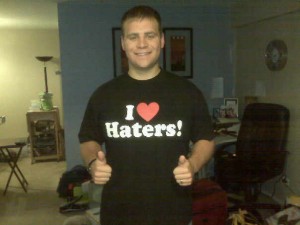A friend called me up the other day and wanted to talk about how I understand the process of bridge building (if you are not clear on what this process looks like, you can watch this and read this). This friend was having problems entering into such spaces because, as they told me,
I just can’t dive fully into “bridge building” because your organization is friends with someone I hate.
This is a statement that I have received a few times recently, from both worldviews within the disconnect, and I would like to address it here.
First, if we are all honest with ourselves, there is probably someone in this world we hate–or, at least however you understand strongly dislike. What if a friend of yours was good friends with that person you hated (strongly disliked)? If I’m being honest again, that would really challenge the trust you might have in that friend.
How can my friend trust, like and be friends with this other person I hate? Can I actually trust my friend anymore? Have they been pulling a fast one on me?
Those are not only legitimate questions, but also questions that are at the core of entering into a bridge building process. Reconciliation cannot happen without two things:
1. The willingness to purse that which is disconnected;
2. Someone or something on the other end of the specturm who has hurt you in some very real way (hence the need for reconciliation in the first place).
Skepticism is an ever-present part of building bridges. But just like many revere the necessity of needing doubt to live fully in your faith, so must a healthy understanding of skepticism with the other happen in building bridges. Here are a few quick reminders of how to live into this skepticism inherent to building bridges with your “other”:
1. One cannot build bridges unless both of the opposing worldviews are actively engaged. That means intentionally facing and engaging with your enemy.
2. If one wants to change what is deemed as culturally normal (e.g. If a friend of mine is friends with someone I hate, then I must also now be skeptic of my friend), one must do what others are unwilling to do. Put down the fear and be bold enough to actually enter the bridge building process; in proximity to your enemy.
3. Sometimes there is no common ground. Sometimes, the common ground is only the commitment to the bridge building process. Building bridges doesn’t mean everyone will agree. It means we can view each other through a lens of worth in our shared humanity, and do good through that view, together.
Even I ran into this exact problem the other week. A friend of mine is quite good friends with a person who has been a very outspoken critic of mine. This outspoken critic has blatantly lied about me in public, made things up about me, obsessively tweets about “the horrors” of me and The Marin Foundation, and has yet to ever talk to me, despite the numerous times I’ve reached out to them.
When I found out that my friend was actually close with this cowardly hater I was deeply offended. I immediately questioned my own trust with my friend. I literally looked at him differently.
How could he ever, ever be friends with such a person?!
Then I caught myself spiraling down this nonconstructive path.
And I quickly realized, I was falling into the same patterns that I ask others to fight against everyday of my life. At that moment I took a deep breath and reassessed my own importance. Reassessed the feelings that come with such an offense. Then began to understand the boldness it takes to suspend hate and insecurity is far greater than the effort it takes to insecurely hate others that hate me for, as I understand it, no good reason.
So what did I do?
I called my friend and had a conversation about why he was such good friends with that other person who was causing so much unnecessary drama.
I came to quickly find out that this other person was not just an evil picture on the interwebs writing horrible lies, etc about me. But this other person was, indeed, a person.
My heart softened, my view of them inched its way to changing, ever so briefly. But the process has begun. I again reached out to my enemy (they didn’t respond, again). But the next time they went public with “horrors” about me, I did see them differently. Their lies still hurt, but what hurt more is that I actually had an emotional response and connection to them (which greatly frustrated me). But none the less I was once again reminded of how powerful bridge building is–even if there ultimately is no bridge to be built.
How I view others, especially those that hate me, is on me. And whether anyone ever agrees with me, likes me or says nice things about me (or not), I know I’m committed to living life the right way as a reconciliatory agent for good.
I must learn to love God enough to see God in my critics.
Much love.












